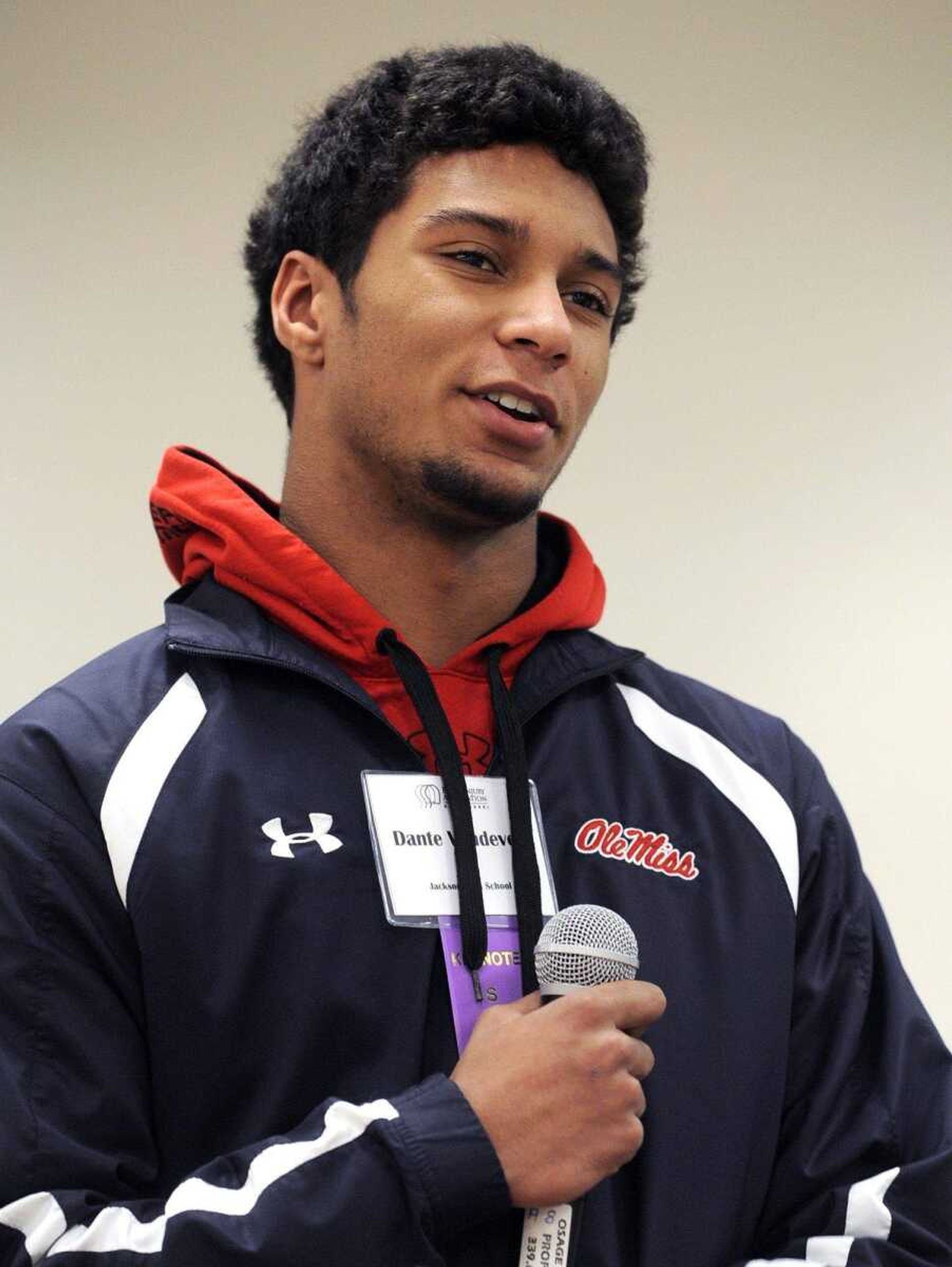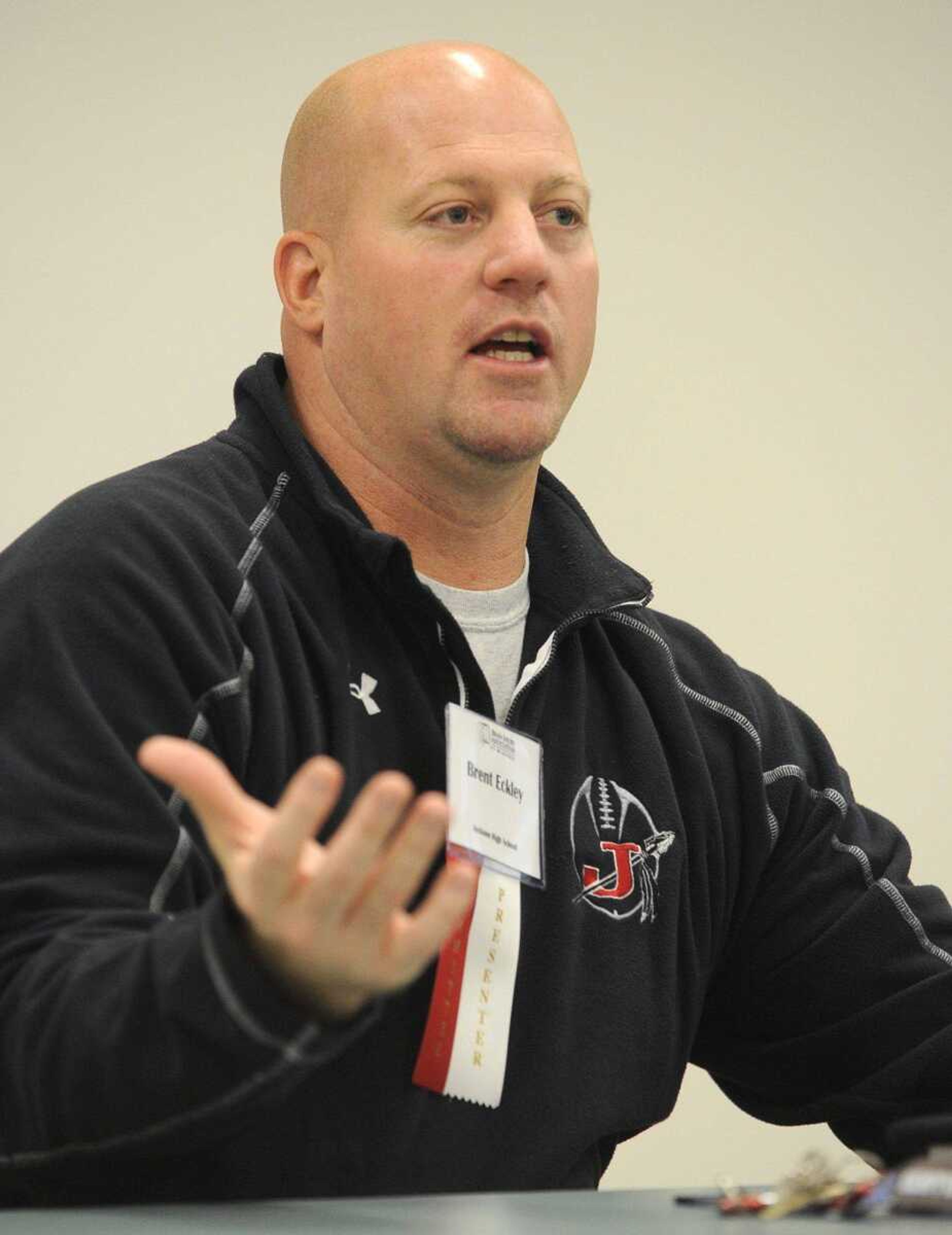Trainers, school officials learn how to deal with concussions at Cape seminar
More than 100 people attended a seminar at the Osage Centre on Wednesday
~ More than 100 people attended a seminar at the Osage Centre on Wednesday
Increased awareness of sports-related head injuries in recent years has led to sweeping changes in the way players -- from youth leagues to the professional ranks -- are evaluated and treated from the time they suffer an injury and throughout the treatment process.
And Missouri stands near the forefront when it comes to awareness and prevention of such injuries, which more than 100 people learned Wednesday during a day-long seminar at the Osage Centre.
Sponsored by the Brain Injury Association of Missouri, the seminar -- titled Sports Concussions: Facts, Fallacies and New Frontiers -- attracted school administrators, teachers, coaches and trainers from area schools. They were presented with several ideas and plans on the prevention and treatment of concussions and other types of traumatic brain injuries.
Dr. Joseph F. Waeckerle, clinical professor of emergency medicine at the University of Missouri at Kansas City School of Medicine and a former team physician for the Kansas City Chiefs and consultant to the NFL on concussion injuries, said much has been done to make violent sports safer, but continued evaluation of these sports-related injuries is still needed.

"I think that we've raised the level of awareness, which is extremely important because we believe that concussions are dramatically underreported and underappreciated," Waeckerle said. "And we better understand that this isn't a minor event that required significant training and expertise to handle, and that the concussed student-athlete will be better from our involvement in their care."
Waeckerle stresses a "Team Plan" concept that involves everyone -- the athlete, coaches, parents, teachers and administrators working with medical personnel to properly diagnose and treat a concussion until the injury has healed.
Instead of waiting for the injured athlete to "clear his or her head," the goal of Waeckerle's Team Plan is the full recovery of the athlete, which means being symptom-free and undergoing a normal neurological examination, cognitive testing and balance testing. The athlete then must be able to participate at the same competitive level of physical activity in his or her sport as before the injury without recurring symptoms.
"We are now beginning to appreciate the short- and long-term complications, especially if we don't care for them properly," Waeckerle said.
Long-term complications can include recurring headaches, memory lapses and loss of motor functions. Alzheimer's and Parkinson's disease have been linked to multiple concussions over a period of time.
Sports such as football, with its many violent collisions and close-encounter pounding, are at the forefront when it comes to reported concussions. To that end, the Missouri State Interscholastic Youth Sports Brain Injury Prevention Act, passed in 2011, prevents any student athlete suspected of sustaining a concussion from returning to practice or play for a minimum of 24 hours. Also, the athlete needs written clearance from a licensed health-care provider before returning to the field.
Athletes who return to action too soon are at increased risk for further injury or complications. And that's where Waeckerle's Team Plan comes into effect.
"Before, coaches weren't educated on that. Parents weren't educated on that," said Steve Nickell, who teaches courses on athletic training at Southeast Missouri State University. "From the '80s through the '90s, we knew this stuff was going on. But if the school district doesn't have a trained medical professional there, then nobody knew what was happening. They didn't recognize it. It became a mentality of: 'I just got my bell rung. Get up and get back on the field.'"
Coaches also are in the loop, often at odds with players and parents who want to see the athlete back on the field too soon. Jackson High School football coach Brent Eckley said he checks with his trainer every day to learn how injured players are responding.
"Our guys know that if they have some type of injury that they need to check with me," Eckley said. "I refer them to the trainer, and the trainer is the one that brings them back to me and lets me know ... if this kid's OK to go or he needs to be modified.
"We're not going to go around behind the trainer, and the kids know that. This is the process you go through."
That process was put into motion several times last football season and earlier. Junior quarterback Dante Vandeven sustained a concussion while relining the pool at his home during the summer. He had to pass a number of tests before he could participate in team drills when practice started in August.
Vandeven said he became lightheaded while working in the pool and passed out. He fell backward and hit his head on the hard surface of the pool. He suffered seizure-like symptoms on his right side. After regaining consciousness, Vandeven said he remained dizzy and was nauseous.
"I didn't know what was going on, and I was kind of scared at the same time," he said. "I didn't know anything that had happened. "[My mother] said I was out for like 30 seconds."
The next day, Vandeven took the concussion test, which showed he had suffered a brain injury. Further tests at Cardinal Glennon Children's Hospital in St. Louis revealed a concussion and blood-pressure problem.
Now fully recovered, Vandeven said he no longer takes a similar injury for granted.
"I'm sure I've had minor ones [in the past]," he said. "I've gotten up dizzy, I've gotten up sick and nauseous, but I didn't go off the field just because of the whole football mentality to stay in there.
"I'm just more aware of what I'm doing after a hit happens or after a play, if I feel different."
Medical personnel are not shy about preventing injured players from returning to the field too soon. Dr. Heidi Hunter of St. Francis Sports Medicine said an athlete's access to activity participation can hinder his or her recovery.
"They have access to iPhones, iPads, computers, video games," Hunter said, noting the number of barriers she and other medical professionals deal with when evaluating an athlete's stage of recovery and stressing the brain needs rest, not stimulation, to recover. "Sometimes (it's) parents, because they don't understand the ramifications of what a child is doing long-term. So a lot of it is education. But really, it's access to everything."
Waeckerle hopes his Team Plan helps today and in the future.
"We can do a lot of things better, and we are in the state of Missouri," Waeckerle said. "We need to have a plan, and we need to implement a plan; we need to understand the plan, and we need to educate people about the plan. We need to carry the plan out and do the right things. And we always need to err on the side of caution."
Connect with the Southeast Missourian Newsroom:
For corrections to this story or other insights for the editor, click here. To submit a letter to the editor, click here. To learn about the Southeast Missourian’s AI Policy, click here.







